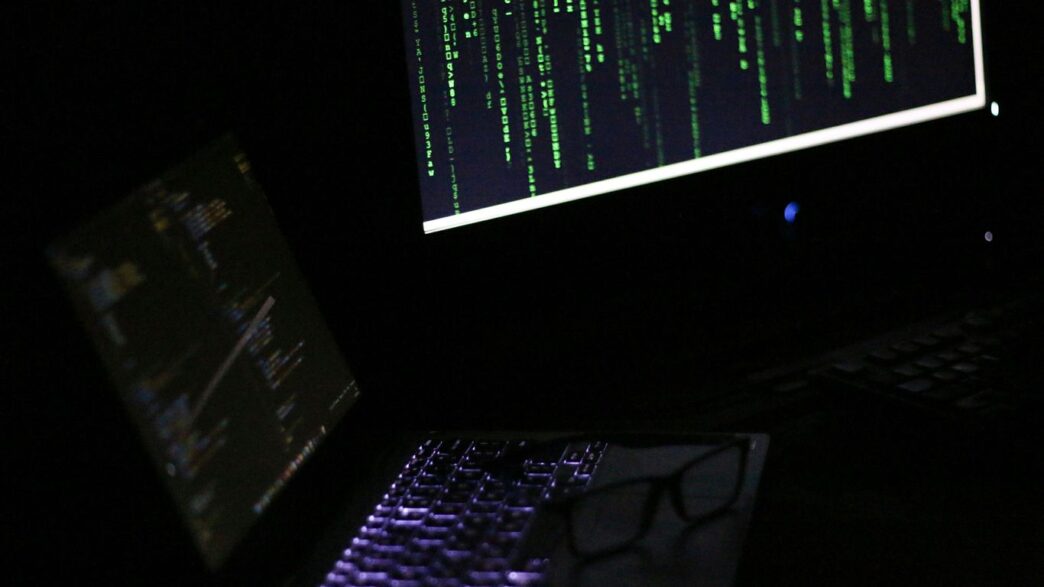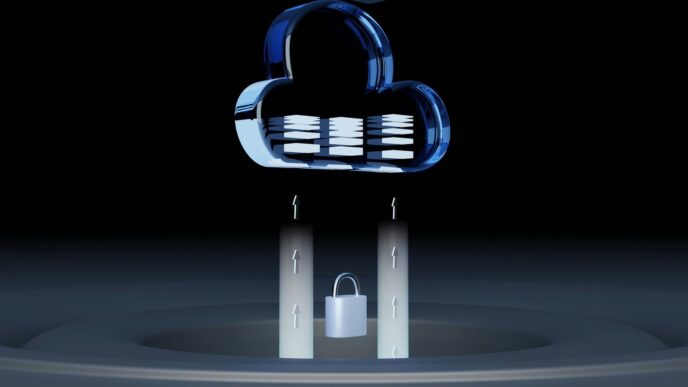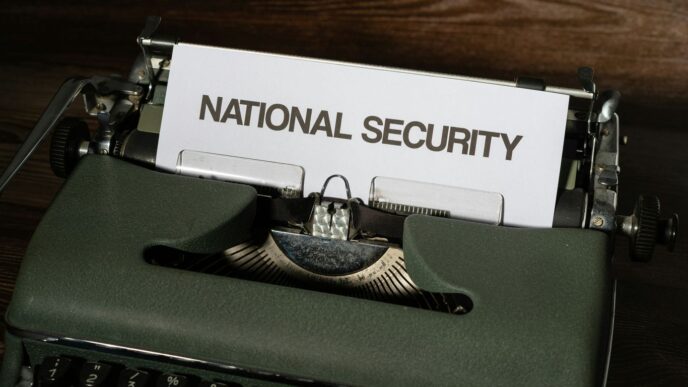It seems like everywhere you look these days, there’s talk about cyber threats. Pakistan is no different, facing its own set of digital challenges. We’re going to take a look at what’s going on, who might be behind some of these activities, and what it all means for the country. It’s a complicated topic, with lots of different angles to consider, especially when we talk about the people involved and the rules that should apply.
Key Takeaways
- Pakistan faces cyber threats from several countries, including India, Russia, Israel, the US, and China.
- The country’s IT infrastructure shows vulnerabilities, with a need for better policy and education.
- Hacking activities in Pakistan have various motivations and impact sectors like finance and military.
- There’s a discussion about the line between hacking and activism, and the legal consequences.
- Improving Pakistan’s digital security means developing tech, protecting data, and working with other nations.
Understanding Cyber Threats Facing Pakistan
Pakistan, like many nations, is increasingly finding itself in the crosshairs of digital conflict. The way we live, work, and even defend ourselves has shifted online, and that’s opened up a whole new set of problems. It’s not just about stolen credit card numbers anymore; we’re talking about threats that can hit our country’s core functions.
National Security in the Digital Age
Think about it: our military systems, government databases, and even critical infrastructure like power grids are all connected. This digital dependency means that a successful cyber-attack could have real-world consequences, potentially disrupting essential services or compromising sensitive national defense information. The digital frontier is now as important to national security as any physical border. It’s a constant battle to keep these systems safe from those who want to exploit them.
Key Threatening Nations
When we talk about who’s posing these threats, it’s a complex picture. While specific attribution can be tricky, intelligence and security reports often point to several countries that have shown capabilities and intentions to target Pakistan’s digital assets. These include nations with ongoing geopolitical tensions, such as India, but also others like Russia, Israel, and even China, each with their own potential motivations. Understanding these actors is key to building defenses. The cyber conflict between India and Pakistan, for instance, has involved a wide range of groups, from state-backed operations to hacktivists exploring cyber warfare tactics.
Vulnerabilities in Pakistan’s IT Infrastructure
Despite efforts to modernize, Pakistan’s IT infrastructure still has weak spots. This can be due to a few things:
- Outdated Systems: Some government and private sector systems might not have been updated with the latest security patches, making them easier targets.
- Lack of Skilled Professionals: There’s a shortage of highly trained cybersecurity experts who can manage and defend complex networks.
- Policy Gaps: While policies exist, their consistent and effective implementation across all sectors can be a challenge.
These vulnerabilities create openings for attackers to exploit, whether through malware, phishing, or more sophisticated methods. Addressing these issues requires a multi-pronged approach, focusing on both technological upgrades and human capital development.
The Landscape of Hackers in Pakistan
When we talk about hacking in Pakistan, it’s not just one big, scary group. It’s a whole mix of people with different reasons for what they do. Some are in it for the money, others for political reasons, and some just to prove they can. It’s a complex scene, really.
Motivations Behind Hacking Activities
People get into hacking for all sorts of reasons. You’ve got the ones who are purely financially motivated, looking to steal bank details or run ransomware scams. Then there are those who see themselves as digital activists, trying to expose corruption or push a political agenda. Sometimes, it’s just about the challenge, the thrill of breaking into systems and showing off their skills. It’s not always about causing harm; sometimes it’s about making a statement or even just learning.
Types of Cyber-Attacks Perpetrated
Pakistan has seen a range of cyber-attacks. We’re talking about things like phishing scams, where people are tricked into giving up personal information. Then there’s malware, which can infect computers and steal data. Denial-of-service attacks are also common, aimed at shutting down websites or online services. More serious are the attacks targeting critical infrastructure, like power grids or financial systems. These can have a real-world impact on everyday life.
Impact on Financial and Military Sectors
The financial sector is a big target. Hackers can steal customer data, disrupt banking operations, or even drain accounts. This erodes trust and can cause significant economic damage. The military and defense sectors are also at risk. Breaches here could expose sensitive information, compromise communication systems, or even disable critical defense capabilities. It’s a constant battle to stay ahead of these threats.
Addressing Cyber-Crime and Aggression
It’s clear that Pakistan faces some serious digital challenges. Dealing with cyber-crime and aggression isn’t just about catching bad guys; it’s about building a stronger digital defense system overall. We need to get serious about making our laws work better and actually putting them into practice. It’s not enough to just have rules on paper; they need to be enforced.
Strengthening Policy Implementation
Right now, Pakistan’s policies for cyber security are a bit like a leaky boat. They exist, but they aren’t always effective. We need to make sure that the laws we have are actually followed. This means giving the right people the resources and training they need to do their jobs. Think about it: if a police officer doesn’t have the right tools or training, how can they catch a cyber criminal? We need a clear roadmap for how policies are put into action and checked. This includes things like:
- Updating laws to keep pace with new technologies.
- Creating specialized cyber-crime units with proper funding.
- Establishing clear reporting mechanisms for cyber incidents.
- Conducting regular audits of policy effectiveness.
Enhancing IT Education and Advancement
Another big piece of the puzzle is education. We can’t expect to win the cyber war if our people aren’t trained for it. This means investing more in IT education from the ground up. We need more skilled professionals who understand the ins and outs of cyber security. It’s not just about university degrees; it’s about practical skills and continuous learning. We should look at programs that teach coding, network security, and digital forensics. Learning from other countries’ approaches to cyber security is also a good idea, especially when it comes to how they structure their educational programs and research cyber security measures in Bangladesh.
Learning from Global Cybersecurity Strategies
Looking at what other countries are doing is smart. Many nations have already gone through this digital growing pain. We can learn a lot from their successes and failures. This isn’t about copying them, but about adapting what works for Pakistan’s specific situation. For example, some countries have set up national CERTs (Computer Emergency Response Teams) that are really effective. Others have strong public-private partnerships for sharing threat information. We need to figure out what strategies fit our needs and implement them. It’s a complex problem, but by focusing on policy, education, and smart learning, we can start to build a more secure digital future.
Ethical Considerations for Pakistani Hackers
When we talk about hacking in Pakistan, it’s not always black and white. There’s a lot of gray area, especially when you consider why people do it and what they hope to achieve. It’s a complex topic, and understanding the different viewpoints is pretty important.
The Debate Between Hacking and Activism
Some folks see hacking as a form of digital activism, a way to bring attention to issues or even to protest against perceived injustices. They might argue that they’re not doing it for personal gain, but to expose corruption or to fight for a cause they believe in. It’s like a modern-day form of civil disobedience, but online. This line between hacking for a cause and illegal activity can get blurry really fast. On one hand, you have groups that might hack into government systems to leak documents they believe the public should see. On the other hand, you have individuals who might use similar skills to steal data for profit or to disrupt services.
Legal Frameworks and Penalties
Pakistan does have laws in place to deal with cybercrime. The Prevention of Electronic Crimes Act (PECA) of 2016 is the main piece of legislation. It covers a range of offenses, from unauthorized access to computer systems to spreading malicious software. The penalties can be pretty serious, including jail time and hefty fines, depending on the severity of the crime. For instance, unauthorized access can lead to imprisonment for up to three years or a fine of up to one million rupees, or both. More serious offenses, like cyber terrorism, carry even harsher penalties.
Here’s a quick look at some potential penalties under PECA:
- Unauthorized Access: Up to 3 years imprisonment or a fine up to PKR 1,000,000, or both.
- Data Tampering: Up to 5 years imprisonment or a fine up to PKR 5,000,000, or both.
- Cyber Terrorism: Imprisonment for life or up to 14 years, or a fine up to PKR 50,000,000, or both.
Promoting Responsible Digital Citizenship
Beyond just the laws, there’s a bigger conversation about what it means to be a good digital citizen. This involves understanding the impact of one’s actions online and using technology responsibly. For those with advanced technical skills, this means considering the ethical implications of their work. It’s about more than just knowing how to break into systems; it’s about knowing when and why you should, and more importantly, when you absolutely shouldn’t. Education plays a big part here, teaching not just the technical skills but also the ethical framework to go along with them. Encouraging a culture of ethical hacking, where skills are used for good, like finding vulnerabilities to help organizations fix them before malicious actors can exploit them, is a positive step forward.
Securing Pakistan’s Digital Future
So, how do we actually make Pakistan’s digital space safer? It’s not just about catching hackers; it’s about building a strong foundation. We need to really push forward with developing our own cyber space technology. Relying too much on outside help isn’t a long-term plan, you know? We’ve got to get better at creating and managing our own digital tools and defenses.
Protecting what’s ours is also a big deal. This means keeping citizen data safe from prying eyes and making sure government systems aren’t easy targets. Think about all the personal information out there – it needs serious protection. And the government’s systems? They’re critical infrastructure, so they need top-notch security.
Here are a few key areas to focus on:
- Prioritizing Cyberspace Technology Development: Investing in research and development for advanced cybersecurity tools and platforms made right here in Pakistan.
- Protecting Citizen Data and Government Systems: Implementing robust data encryption, access controls, and regular security audits for all sensitive information.
- The Role of International Cooperation: Working with other countries on intelligence sharing and joint efforts to combat cyber threats, because these problems don’t respect borders. Learning from global cybersecurity strategies is also a good idea, as mentioned in some research on cyber security in Pakistan.
It’s a big job, for sure. It requires a coordinated effort from the government, the private sector, and even us as individuals. Building a secure digital future means continuous effort and adaptation. We can’t just set it and forget it; the threats are always changing, so our defenses need to change too.
Looking Ahead: The Evolving Cyber Landscape
So, what does all this mean for Pakistan’s digital future? It’s clear the country faces some serious challenges when it comes to online security. We’ve seen how threats from various nations are a real concern, and there’s a definite need to beef up IT skills and policies. It’s not just about stopping hackers; it’s about building a stronger, safer online space for everyone. This means investing in technology, educating people, and learning from what works elsewhere. Plus, making sure the laws we already have are actually being used properly is a big part of the puzzle. It’s a complex situation, but addressing these issues head-on is key to protecting everything from government systems to personal data.
Frequently Asked Questions
What kind of online dangers does Pakistan face?
Pakistan faces many digital dangers that can harm its safety and security. These include attacks on government computer systems, financial networks, and even the military. Bad actors from other countries can try to steal information or cause disruptions.
Who are the main countries that pose cyber threats to Pakistan?
Some countries that have been identified as posing cyber threats to Pakistan include India, Russia, Israel, the United States, and China. These nations may have different reasons for targeting Pakistan’s digital world.
What makes Pakistan’s computer systems vulnerable?
Pakistan’s computer systems can be vulnerable because its technology might not be as advanced as some other countries. Also, there’s a need to better enforce rules and policies related to computers and the internet, and to improve how people are taught about technology.
Why do hackers in Pakistan do what they do?
Hackers in Pakistan, like elsewhere, might be motivated by various reasons. Some could be trying to make money, others might be doing it for political reasons or as a form of protest, and some might just be curious or want to show off their skills.
How can Pakistan improve its online safety?
To become safer online, Pakistan needs to focus on developing its own technology, making sure citizen data and government systems are protected, and teaching more people about advanced computer skills. Learning from how other countries handle cyber safety is also important.
Is there a difference between hacking and being a digital activist?
Yes, there can be a difference. Hacking usually means breaking into computer systems without permission, often for harmful reasons. Digital activism, on the other hand, uses online tools and sometimes similar methods to promote social or political change, but the goals and ethics can be very different.














